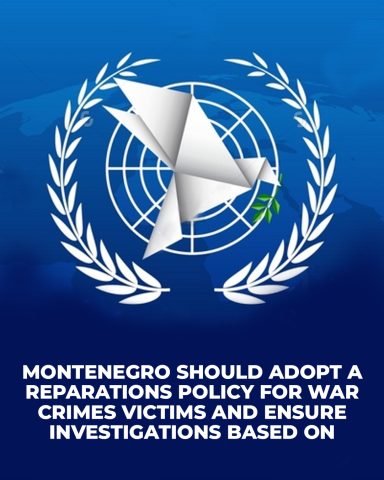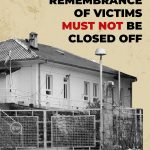
MONTENEGRIN STATE PROSECUTION INTENSIFIES EFFORTS ON WAR CRIMES CASES AND ENHANCES INTERNATIONAL COOPERATION
01/04/2025
HRA AND WRC REGARDING THE DISCONTINUATION OF THE STUDENT GROUP “KAMO SJUTRA?”
06/04/2025MONTENEGRO SHOULD ADOPT A REPARATIONS POLICY FOR WAR CRIMES VICTIMS AND ENSURE INVESTIGATIONS BASED ON COMMAND RESPONSIBILITY

Human Rights Action calls on the Government of Montenegro to immediately begin preparing a comprehensive reparations policy for all victims of war crimes for which the state bears any responsibility or that were committed on its territory, thereby implementing the recommendation of the United Nations Human Rights Committee. We also expect that this year, the Special State Prosecutor’s Office will align with the expectations of the Human Rights Committee, as well as those of the victims and civil society, by initiating investigations into both command responsibility and the ineffectively or incompletely prosecuted cases of Morinj Camp, Deportation, Bukovica, and Kaluđerski Laz.
The reparations policy should primarily include a plan for compensating undisputed victims of crimes who have been denied reparation due to the state’s budget protections through the interpretation of statutes of limitations and the unsuccessful determination of criminal responsibility for war crimes. It is vital that this policy addresses the needs of all victims, none of whom should bear responsibility for the state’s failures. Additionally, the policy should encompass plans for memorializing victims at the sites of war crimes within Montenegro and express a commitment for the state to collaborate in memorializations in neighboring countries such as Croatia, Bosnia and Herzegovina, and Kosovo.
Equally important is the state’s urgent need to organize more effective efforts in searching for the remains of victims who are still missing, including those from the Refugee Deportation, the abductions in Štrpci, and the murdered members of the Klapuh family, whose remains are located in the municipality of Nikšić.
The Human Rights Committee in Geneva, which oversees the implementation of the International Covenant on Civil and Political Rights, recently published concluding observations on Montenegro’s second periodic report regarding this international human rights treaty.
Regarding responsibility for war crimes (violations of human rights from the past), the Committee praised Montenegro’s cooperation with the International Residual Mechanism for Criminal Tribunals and with regional states. The reopening of the Morinj, Bukovica, Kaluđerski Laz, and Refugee Deportation cases was particularly commended, as it “aligns with international standards for prosecuting serious human rights violations.” However, the Committee expressed concern about the lack of concrete results in bringing those responsible to justice, as well as the absence of prosecutions based on command responsibility.
“The State party should strengthen capacity for the prompt and effective investigation and prosecution of war crimes cases, including by ensuring all prosecutorial positions are filled and that judges and prosecutors receive an institutionalised programme of specialised training on international criminal and humanitarian law, victims’ rights, and best practices in handling war crimes cases. The State party should expedite the conclusion of ongoing cases and investigate, and where appropriate, prosecute cases relating to command responsibility.“
The Committee pointed to the lack of a comprehensive reparations policy for war crime victims, which should, in addition to compensation (reparation), include measures of restitution, satisfaction, rehabilitation, and guarantees of non-repetition. It expressed concern that victims have been unable to obtain compensation due to the interpretation of the statute of limitations on their claims. The issue of the unresolved fate of missing persons, including victims of enforced disappearances, was also highlighted.
The Committee called on Montenegro “to adopt, within the broader framework of transitional justice and in consultation with victims and civil society organizations, a comprehensive reparations policy that addresses compensation, rehabilitation, satisfaction, restitution and guarantees of non-recurrence taking into account the Basic Principles and Guidelines on the Right to a Remedy and Reparation for Victims of Gross Violations of International Human Rights Law and Serious Violations of International Humanitarian Law. This should include:
(a) Ensuring that all victims receive full reparation for human rights violations committed during the war, including by removing obstacles that hinder access to compensation such as statutes of limitations and nationality restrictions;
(b) Ensuring effective access to adequate legal aid for victims to pursue claims including for the families of missing persons;
(c) Enhancing efforts to clarify the fate and whereabouts of persons who went missing during the war, some of whom may have been victims of enforced disappearance, informing victims’ families regularly about the status and outcome of investigations;
(d) Proceeding with amendment of the Criminal Code to establish enforced disappearance as a standalone offence;
(e) Strengthening support to civil society’s efforts to assist victims and for memorialization.”
Human Rights Action has repeatedly called for the adoption of the same policy now proposed by the Human Rights Committee, addressing the Governments of Duško Marković, Zdravko Krivokapić, Dritan Abazović, and Milojko Spajić. However, despite these requests, the policy has not been adopted to date, without any explanation.







 English
English